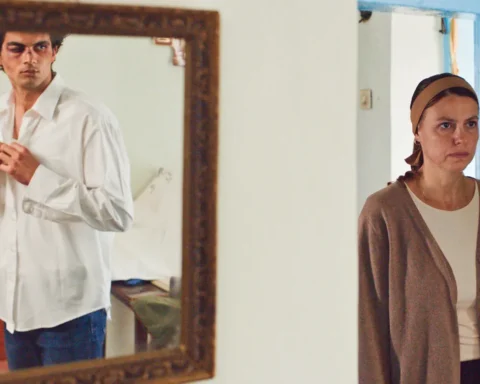Let’s first summarize here a few avant-garde approaches in which Noé merges with Godard, the Godfather of NFE:
-the violation of convention, overturning the audience expectations
-creatively playing with the technical features and thereby creating a striking atmosphere required by extremity
-the emphasis on ‘l’art pour l’art’ (art for art’s sake), covering only a certain segment of the audience
– questioning what the cinema is (even today)
-starting the film with a manifesto
– a script consisting only 3-5 pages and the rest leaning on the improvisational dialogues
Etc.
Now over the movie:
In fact, the skeletal analysis of the film is already present in the manifesto he gave at the prologue:
“Because time destroys everything
Because some acts are irreparable
Because man is an animal
Because the desire for vengeance is a natural impulse
Because most crimes remain unpunished
Because the loss of a loved one destroys like lightning
Because love is the source of life
Because all history is written in sperm and blood
Because in a good world
Because premonitions do not alter the course of events
Because time reveals everything
The best and the worst.”
Starting with the technique first; by the reverse chronological editing of the film, it focuses first on the irreversibility very strongly starting with the title of the film self; as well as our inability over time, the destructiveness of time which shreds the life in pieces, lastly it invites the audience to focus on the moment and not the concept of casuality; a unique Noé ability to tip the cap to.
The choice of the 28 hertz distortion gives one of the most powerful effect of the non-diegetic film music ever. The light and color could just not have been put in any other way; the color of the hell is only red, that simple. This is the very same feeling in both ‘rectum’ and the underpass as a path to hell.
The camera movements have the same purpose as the dope effect in Enter the Void, the character is at the bottom of hell, his helpless state cannot even be described and the audience could only experience what he felt with those very preferred camera movements of Noé. In summary, the audio-visual elements in the film are just as extreme as the plot. Although this NFE technique does not connect the attentive audience by including them in the film’s world (which it well might be), it is nevertheless an element that directly alienates the careless/reluctant audience.
I wish I had seen the movie first in the cinema where all these technical features were maximized…
The movie is as well Freudian because ID (Tenia) – ego (Alex)- superego (Pierre)- and most probably Marcus swings between both ID and the ego. The subject can also be summarized as the relationship that the ego establishes with the inner and outer world through one’s defense mechanism. The limitedness and limitlessness of the of the human being which has not been “domesticated” by modernism itself (of course ID-form) is already proven in Marina Abramovic’s performance Rythm Zero. In the very same wat, art should not be abstracted from anything in life, here indicates Noé. Going back to the movie, the reference of this ID emphasis with a Space Oddysey is a nice catch for the attentive audience.
The rectum and the underside can be interpreted as hell or the subconscious, they both have their indicators in the movie (more the hell, I believe).
The woman being pregnant was an unnecessary drama element, unless of course the baby would eventually turn into the Space Odyssey character on the poster at the wall back of the bed 🙂
The fact that the movie is independent of a full-text script and with the improvised dialogues (especially the subway) makes you feel like you’re in one of the movies from the Nouvelle Vague era.
On the other hand, moralistic interpretation of the film would mean to miss Noé and his clear message completely; since it has nothing to do with the plot and focus of the movie; Noé deals purely with the reality in all its consternation. The only moralistic interpretation may be depicted from the words of the pimps (who convinced Marcus for revenge) in ways of criticizing the legal system. I think it has an existential and even a feminist approach through the female body; the message of commoditizing the female body through male ownership and show off the masculine potent, both in the loving words of ‘the good man’ Marcus in bed and the insults of Tenia, is just too obvious. And the trans-person Marcus saved just walks away afterwards even without a thank or looking back once.
Speaking of subverting audience expectations, we see it in some scenes; the indifference of the man who saw what was going on in the underpass, but not offering any help (or could this be a criticism he made to the audience?). The fact that the man with whom he spoke to was not the Tenya, we can interpret it both against the expectation of the audience and as the purest expression of the helpless state that Marcus was in, rather than the act of killing the aim/target itself. While the person who should have been the killer (Marcus) was lying on the floor; his friend fnishing him, it’s not exactly an X and Y match.
As well the rape and violence scenes in the movie have to be purely shown as they are. Whatever is not abstracted from life should not be abstracted from the art or cinema neither, otherwise wouldjust be hypocritic. Because we can either leave the movie by putting the scenes of violence in our pockets and go out; or the pain, helplessness, inevitably depleted mood and sadness of Marcus that happened to someone he loves very much. I think it’s a bit of a reflection of ourselves on what we accept and reject.
Alex’s peaceful sleep on the grass in the last scene may also be related to this audience-expectation issue. Or could it be the emphasis that time kills / destroys everything? Noé is here approaching the reality again based on the fact that peace, like violence, is just another piece of the life. Or is he just mocking with the convention, pouring a glass of water over the fire het set after all those hardcore scenes.
I think Irreversible is another dance macabre by Gaspar Noé. It’s almost like a colonoscopy of being human in the symbolic, imaginary or real sense. Is it possible to despise one of the body’s most vital organs just because it produces the stools – or can it just be removed from the body? No, obviously. For the very same reason, we certainly do not have the luxury of isolating and excluding NFE, Noé and Irreverisble from the art of the cinema itself.
Last but not least, it is no surprise that the New Extremity did not come out from another country, because when it comes to the revenge and violence, the French like it hot indeed.
Nil Birinci






